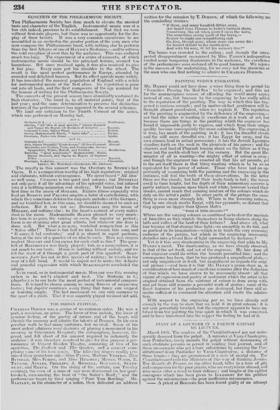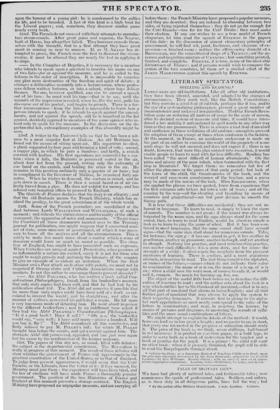DIARY OF A LOUNGER IN A FRENCH CABINET DE LE
OTC !IE.
March 19th. The readers of the Constitutionnel are not unfre- quently damned from the pulpit. A minister at Vaux-Chantegue, near Pontarlier,•rarely mounts the pulpit without denouncing all such obstinate persons as persist in reading, that journal, and all those messengers who get a bare subsistence by Carrving the Cou- stitutionnel from Pontarlier to Vaux-Chantegrue, a distance of three leagues : they are pronounced in a state of mortal sin. The Constitalionnel calls the Ministers of this way of thinking Jesuits. The Ga,zette de France, on the other hand, talks in a tone of pity and compassion for the poor priests, who are everywhere abused, and who never utter a word in their defence ; and laughs at the epithet couraweur which has been given to 1SAMBERT for his petition against the missionarieas--the poor inoffensive missionaries.
— A priest at Beauvais has been found guilty of an attempt upon the honour of a young girl: he is condemned to the gallies for life, and to be branded. A fact of this kind is a high treat for the Liberal papers ; and, somehow, they discover similar game nearly every week.
22nd. The French do not succeed with their attempts to manufac- ture steam-vessels. After great pains and expense, the Na,reur, built at Havre, has altogether failed. They however console them- selves with the thought, that in a first attempt they have gi.eat merit in coming so near to success. If, as M. ARAGO has at- tempted to prove,..the French were the first to discover the sl eam- engine, it must be allowed they are nearly the last in applying it to ships.
— In the Chamber of Deputies, it is necessary for a member who intends to speak upon a question to inscribe his name on one of two lists—for or against the measure, and he is called to the tribune in the order of inscription. It is impossible to conceive any plan more destructive of the freedom and spirit of debate : it changes a deliberative assembly into a lecture-room, where profes- sors deliver written lectures, or into a school, where boys deliver themes. No one, however qualified, can rise to answer a speech out of his turn : he must wait his time—that is to say, until the warmth of the inipression is cooled, when he, like the rest, pulls his discourse out of his pocket, and begins to preach. There is a hu- ffier inconvenience—from the lists it is impossible to learn how a person intends to speak : if he intends 'to speak against the amend- ments, and not against the speech, still he is inscribed in the list against, decidedly opposed to members of the same opinion who in- tend only to speak for the measure. In the discussion on the de- partmental law, extraordinary examples of this absurdity might be seen.
23rd. A miter in the Universel tells us that he has been a wit- ness to a most singular feat at Madras. An old Brahmin has found out the means of sitting upon air. His apparatus is—first, a plank supported by four pegs and forming a kind of sofa ; second, a copper pipe, in which he puts a bamboo ; and lastly, a crutch covered with leather. , His first operations are concealed by a cur- tain : when it falls, the Brahmin is perceived seated in the air, about four feet from the ground, resting only the extremity of one hand on the crutch, and holding the other in the air. He remains in this position ordinarily only a quarter of an hour ; but in compliment to the Governor of Madras, he remained forty mi- nutes. When he wishes to descend, the curtain is raised, and he gets down in secret. There is then a sound heard as of air vio- lently forced from a pipe. He does not exhibit for money, and has refused very tempting offers to proceed to England. The Gazette de France declares that the story is an allegory ; and that the old Brahmin means the French Ministry, which has re- alized the prodigy, to the great astonishment of the whole world.
25th. Some of the French journalists are scandalized at the duel between Lords WELLINGTON and WiNcninsEA, at such a moment; and ridicule the elaborateness and formality of the official statement; the apparatus of notes and memoranda. "To see (says the Courrier) all these documents handed over to the Treasury journal for publication, one might suppose that it concerned sonic act of state, some measure of government, of which it was neces- sary to know all the motives and all the circumstances. This is surely to make too much noise about a matter which a sense of decorum would leave as much in secret as possible. The situa- tion of England, too, ought to have prevented such an exposure. When Cat holies are arrayed against Protestants, when passions of so inflammable a nature are excited, surely it is not for those who ought to weigh gravely and maturely the interests of the country to give an example of so violent an irritation. When the First Minister and a Peer attack each other with pistols, we must not be .surprised if Orange clubs and Catholic Associations engage with muskets. Is not this rather to encourage than to prevent disorder ?" — An Abbe PAGANEL, who has writ lea a book called Con- siderations Philosophiques, found, from his bookseller's account, that only sixty copies had been sold, and that he had lost by his publication about 35/. The Abbe did not conceive it possible that no more than sixty copies could have been sold of a work so cal- culated to interest the world ; and he straightway, and after the manner of authors, conceived his publisher a rogue. He hit upon a very ingenious mode of detecting him. He went about in person to the different booksellers ; and in an indifferent lone asked if they had the Abbe PAGANEL'S Considerations Philosophiques. • " Is it a good book ? Does it sell ?" " Oh .yes," the bookseller would say, " very well ; I have sold many—above a hundred. Will you buy it, Sir ?" The Abbe considered all this conclusive, and flatly refused to pay M. PILLET'S bill ; for which M. PILLET brought him before the courts, and got a verdict against him. The obstinate Abbtl still persevered, appealed, and has just now again lost his cause by the confirmation of the former sentence.
31st. The papers of this day are, as usual, filled with debates: the sub i
ject s the departmental constitution. The Revotution is really in progress at this moment. The result of these debates will show whether the government of France will approximate to the practical constitution of the United States, or to that of England. To judge from present appearances, it would seem that the Cot(' Gauche, or the Liberals, have the better of it : if they succeed, the Ministry must join them : the experiment will have been tried, and the law of elections will have made France a thoroughly popular government. The position of the two Ministries of France and England at this moment presents a strange contrast The English
lnistryhave proposed an unpopular measure, andare carrying all
before them : the French Ministry have proposed a popular measure, and they are deserted : they are reduced to choosing between two sides, or being rejected themselves : they do not go far enough for the Cote Gauche—too far for the Cote Droite : they must make their election. If any one wishes to see a true model of French eloquence, let him read the speech of Rrir.:Ivxm in the papers of this date : in the discussion of almost element an" principles of government, he will find wit, point, liveliness, and elegance of ex- pression—a finished essay ; neit her the effervescin, draught of a B G H AM, nor time concentrated drops of a Ti ERNE 1', nor the ge- nerous and inspiriting mixture of CANNING ; but something pointed, finished, and complete. ETIENNE, it is true, is one of the most able litterateurs of France ; and if persons would wish to compare the genius of the two countries, let them set a studied effort of Sir JAMES MACKINTOSH against this speech by ETIENNE.



















 Previous page
Previous page